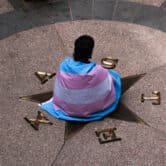WASHINGTON (CN) — Special counsel Jack Smith plans to present evidence at Donald Trump’s election subversion trial that asserts Trump intentionally “sent” his angry supporters to the U.S. Capitol on Jan. 6, 2021, to halt the election certification despite knowing his claims of election fraud were false.
In a court filing made public Tuesday, Smith outlined the evidence he and his team plan to show at trial to establish the former president’s motive, intent, preparation and knowledge of the crimes with which he's charged.
The government’s notice comes after Trump’s legal team cast a wide net for records that would support Trump’s claims that the 2020 election was compromised and that undercover government agents, not him, were responsible for inciting the riot.
Molly Gaston, a member of the special counsel team, provided a preview for the prosecution’s case, which will reach back to Barack Obama’s 2012 election victory to establish that Trump has a long history of spreading baseless claims of election fraud for election results he dislikes.
Most notably, Gaston revealed that the prosecution will seek to link Trump directly to the violence at the Jan. 6 insurrection, arguing that he was aware his rhetoric enraged his supporters and had driven them to violence in the past.
Gaston pointed to a pattern where Trump targets his perceived opponents online — even including individual poll workers, like Ruby Freeman and her mother in Georgia — which his supports follow up with threats of their own.
“Evidence of the defendant’s post-conspiracy embrace of the particularly violent and notorious rioters is admissible to establish the defendant’s motive and intent on January 6 — that he sent supporters, including groups like the Proud Boys, whom he knew were angry, and whom he now calls ‘patriots,’ to the Capitol to achieve the criminal objective of obstructing the congressional certification,” Gaston wrote in the notice.
The Smith and Gaston will also seek to prove that Trump and his advisers, including his six unnamed co-conspirators included with him in his August indictment, knew that their claims of widespread election fraud were false.
Gaston highlighted how Trump repeatedly “sidelined” advisers who told him, or the public, the truth that he lost the election, specifically pointing at Trump’s retaliation Justin Riemer, former Chief Counsel to the Republican National Committee who called Trump’s election fraud theories a “joke.”
“The defendant and his co-conspirators’ and agents’ aggression in stifling dissent against election fraud claims before, during and after the charged conspiracies is admissible to demonstrate their plan for depicting their election lies as true, and to show their intent to silence anyone who refuted their false claims,” Gaston wrote.
John Lauro, Trump’s lead lawyer in Washington, filed a Nov. 27 motion to compel discovery from government agencies that would support his client’s “alternative facts” surrounding the 2020 election and the Jan. 6 riot. While the legal effort will likely be viewed as a “fishing expedition” by U.S. District Judge Tanya Chutkan, it previews more of Trump’s defense in the case.
Ultimately, Lauro’s filing hints at a chaotic March trial, where Trump and his lawyers will reject the government’s position and try to frame its case as politically biased, challenging even the established facts as proof of a deeper plot by President Joe Biden to keep the leading GOP contender out of the White House.
Chutkan, a Barack Obama appointee, denied one of Trump’s main pre-trial defenses: a motion to dismiss the charges based on presidential immunity. The judge found Trump couldn't claim his his actions before, during and after Jan. 6 were part of his presidential duties. Trump is likely to appeal the ruling, which could delay Trump’s March trial date.
Trump faces four charges in Washington related to his efforts to spread doubt of his 2020 electoral defeat, pressure local and federal election officials to influence the election results and to outright overturn the election as it was certified on Jan. 6, 2021.
He faces another federal trial in Florida, set for May 2024, for his handling of classified documents at his Mar-a-Lago resort; state charges in Georgia for interfering in the state's 2020 election; and a New York trial, set for March 2024, related to hush money payments to Stormy Daniels in 2016.
Trump is also in the midst of a civil fraud trial in Manhattan, where he has taken the stand once and has repeatedly lambasted the case as part of a political witch hunt against him. He is expected to testify again on Dec. 11.
Subscribe to Closing Arguments
Sign up for new weekly newsletter Closing Arguments to get the latest about ongoing trials, major litigation and hot cases and rulings in courthouses around the U.S. and the world.









